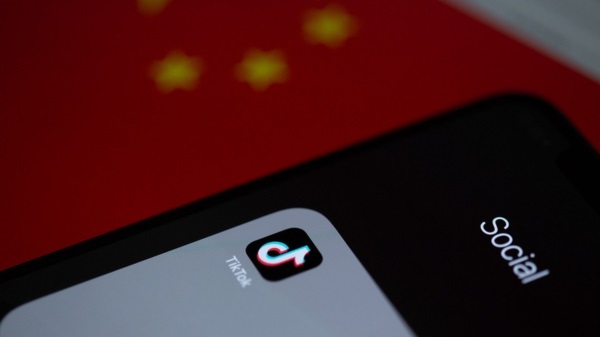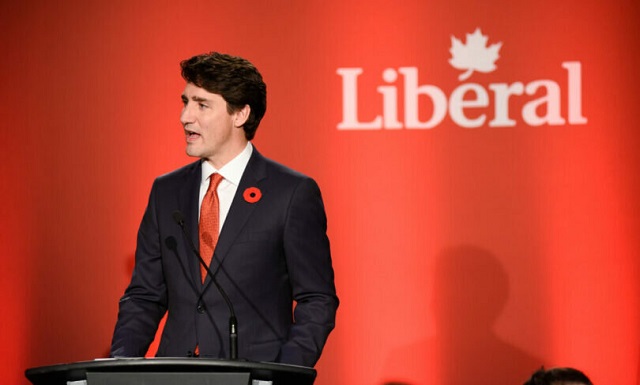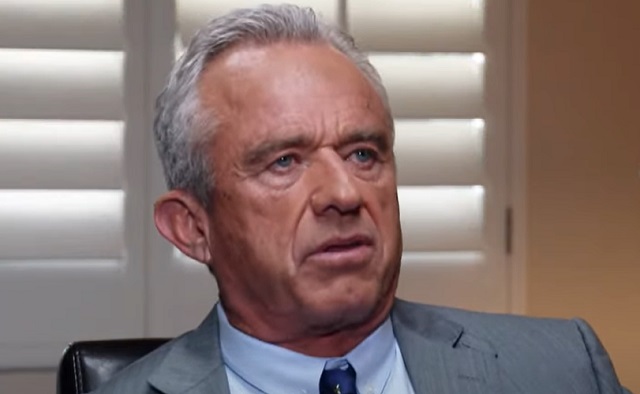Opinion
Judge Andrew P. Napolitano: Can Congress Ban TikTok?

From Heartland Daily News
“Congress shall make no law … abridging the freedom of speech.”
–First Amendment to the U.S. Constitution
When James Madison set about to draft the Bill of Rights — the first 10 amendments to the U.S. Constitution — he was articulating what lawyers and philosophers and judges call “negative rights.” A positive right grants a privilege, like a driver’s license. A negative right restrains the government from interfering with a preexisting right. In order to emphasize his view that the freedom of speech preexisted the government, Madison insisted that the word “the” precede “freedom of speech” in the First Amendment.
If the freedom of speech preceded the government, where did it come from?
Speech is a natural right; it comes from our humanity. The framers of the Constitution and the ratifiers of the Bill of Rights understood and recognized this. Congress doesn’t grant the freedom of speech; rather it is prohibited absolutely from interfering with it. In the years following the ratification of the 14th Amendment, the courts began applying the restrictions in the First Amendment to the states and their municipalities and subdivisions.
Today, the First Amendment bars all government — federal, state and local — and all branches of government — legislative, executive and judicial — from interfering with the freedom of speech.
You’d never know this listening to Congress today. The same Congress that can’t balance a budget or count the number of foreign military bases the feds own, that thinks it can right any wrong and tax any event, that has borrowed over $34 trillion and not paid back any of it; the same Congress now wants to give the President of the United States — whomever might occupy that office — the lawful power to suppress websites he thinks are spying on their users or permitting foreign governments to influence what folks see on the sites. All this is an effort to ban the popular website for young folks called TikTok and force its owners to sell its assets.
Here is the backstory.
Throughout American history, we have suffered from mass fears. In the 1790s, it was fear of the French and of Native Americans. In the 1860s, it was fear of African Americans and fear of Confederates. In the 1900s, it was fear of anarchists, Nazis and Communists. In the first quarter of the present century, the government has whipped up fear of terrorists, Russians, Saddam Hussein, Vladimir Putin and now the Chinese.
In his dystopian novel, “1984,” George Orwell analyzed the totalitarian mind and recognized the need that totalitarians have for fear and hatred. They know that when folks are afraid, they will bargain away the reality of liberty for the illusion of safety. Without fear and hatred, totalitarians have fewer tools for control of the population.
What is the government’s problem with TikTok? The feds want to use fear and hatred of the Chinese government in order to regulate the sources of data and information that Americans can consult. They have projected upon the government of China the very same unlawful and unconstitutional assaults on natural rights that the feds themselves perpetrate upon us.
Thus, in order to gain control over the American public, the deep state — the parts of the government that do not change, no matter which political party is in power — and its friends in Congress have advanced the myth that the Chinese government, which commands the loyalty of the owners of TikTok, might use the site to pass along misinformation or to spy on its users. The key word here is “might,” as the intelligence officials who testified to Congress on this were unable to produce any solid evidence — just fear — that the Chinese government is doing this.
You can’t make this up.
Remember the bumper stickers from the 1970s: “Don’t steal. The government hates competition!” I thought of that line when analyzing this. Why? Because the federal government itself spies on every American who uses a computer or mobile device. The federal government itself captures every keystroke touched on every device in the U.S. The federal government itself captures all data transmitted into, out of and within the U.S. on fiber-optic cables. And the federal government itself told the Supreme Court earlier this week that it needs to be able to influence what data is available on websites in order to combat misinformation.
The federal government basically told the court that it — and not individual persons — should decide what we can read and from what sources. What the federal government did not reveal is its rapacious desire to control the free market in ideas.
Now back to the First Amendment.
The principal value underlying the freedom of speech is free will. We all have free will to think as we wish, to say what we think, to read what we want, to publish what we say. And we can do all this with perfect freedom. We don’t need a government permission slip. The whole purpose of the First Amendment is to guarantee this freedom by keeping the government out of the business of speech — totally and completely. This is the law of the land in modern Supreme Court jurisprudence.
Were this not the law, then the government could suppress the speech it hates and fears and support the speech of its patrons. And then the values that underly the First Amendment would be degraded and negated. The government has no moral or constitutional authority to spy on us or to influence our thoughts. Period.
Does the government work for us or do we work for the government? Have we consented to a nullification of free speech in deference to whomever might be living in the White House? Why do we repose the Constitution into the hands of those who subvert it?
To learn more about Judge Andrew Napolitano, visit https://JudgeNap.com.
COPYRIGHT 2024 ANDREW P. NAPOLITANO
DISTRIBUTED BY CREATORS.COM
For more great content from Rights, Justice & Culture News.
Automotive
The EV ‘Bloodbath’ Arrives Early

 From the Daily Caller News Foundation
From the Daily Caller News Foundation
By David Blackmon
Ever since March 16, when presidential candidate Donald Trump created a controversy by predicting President Joe Biden’s efforts to force Americans to convert their lives to electric-vehicle (EV) lifestyles would end in a “bloodbath” for the U.S. auto industry, the industry’s own disastrous results have consistently proven him accurate.
The latest example came this week when Ford Motor Company reported that it had somehow managed to lose $132,000 per unit sold during Q1 2024 in its Model e EV division. The disastrous first quarter results follow the equally disastrous results for 2023, when the company said it lost $4.7 billion in Model e for the full 12-month period.
While the company has remained profitable overall thanks to strong demand for its legacy internal combustion SUV, pickup, and heavy vehicle models, the string of major losses in its EV line led the company to announce a shift in strategic vision in early April. Ford CEO Jim Farley said then that the company would delay the introduction of additional planned all-electric models and scale back production of current models like the F-150 Lightning pickup while refocusing efforts on introducing new hybrid models across its business line.
General Motors reported it had good overall Q1 results, but they were based on strong sales of its gas-powered SUV and truck models, not its EVs. GM is so gun-shy about reporting EV-specific results that it doesn’t break them out in its quarterly reports, so there is no way of knowing what the real bottom line amounts to from that part of the business. This is possibly a practice Ford should consider adopting.
After reporting its own disappointing Q1 results in which adjusted earnings collapsed by 48% and deliveries dropped by 20% from the previous quarter, Tesla announced it is laying off 10 percent of its global workforce, including 2,688 employees at its Austin plant, where its vaunted Cybertruck is manufactured. Since its introduction in November, the Cybertruck has been beset by buyer complaints ranging from breakdowns within minutes after taking delivery, to its $3,000 camping tent feature failing to deploy, to an incident in which one buyer complained his vehicle shut down for 5 hours after he failed to put the truck in “carwash mode” before running it through a local car wash.
Meanwhile, international auto rental company Hertz is now fire selling its own fleet of Teslas and other EV models in its efforts to salvage a little final value from what is turning out to be a disastrous EV gamble. In a giant fit of green virtue-signaling, the company invested whole hog into the Biden subsidy program in 2021 with a mass purchase of as many as 100,000 Teslas and 50,000 Polestar models, only to find that customer demand for renting electric cars was as tepid as demand to buy them outright. For its troubles, Hertz reported it had lost $392 million during Q1, attributing $195 million of the loss to its EV struggles. Hertz’s share price plummeted by about 20% on April 25, and was down by 55% for the year.
If all this financial carnage does not yet constitute a “bloodbath” for the U.S. EV sector, it is difficult to imagine what would. But wait: It really isn’t all that hard to imagine at all, is it? When he used that term back in March, Trump was referring not just to the ruinous Biden subsidy program, but also to plans by China to establish an EV-manufacturing beachhead in Mexico, from which it would be able to flood the U.S. market with its cheap but high-quality electric models. That would definitely cause an already disastrous domestic EV market to get even worse, wouldn’t it?
The bottom line here is that it is becoming obvious even to ardent EV fans that US consumer demand for EVs has reached a peak long before the industry and government expected it would.
It’s a bit of a perfect storm, one that rent-seeking company executives and obliging policymakers brought upon themselves. Given that this outcome was highly predictable, with so many warning that it was in fact inevitable, a reckoning from investors and corporate boards and voters will soon come due. It could become a bloodbath of its own, and perhaps it should.
David Blackmon is an energy writer and consultant based in Texas. He spent 40 years in the oil and gas business, where he specialized in public policy and communications.
Business
Honda deal latest episode of corporate welfare in Ontario

From the Fraser Institute
By Jake Fuss and Tegan Hill
If Honda, Volkswagen and Stellantis are unwilling to build their EV battery plants in Ontario without corporate welfare, that sends a strong signal that those projects make little economic sense.
On Thursday, the Trudeau and Ford governments announced they will dole out an estimated $5 billion in corporate welfare to Honda so the auto giant can build an electric vehicle (EV) battery plant and manufacture EVs in Ontario. This is the third such deal in Ontario, following similar corporate welfare handouts to Volkswagen ($13.2 billion) and Stellantis ($15.0 billion). Like the previous two deals, the Honda deal comes at a significant cost to taxpayers and will almost certainly fail to create widespread economic benefits for Ontarians.
The Trudeau and Ford governments finalized the Honda deal after more than a year of negotiations, with both governments promising direct incentives and tax credits. Of course, this isn’t free money. Taxpayers in Ontario and the rest of Canada will pay for this corporate welfare through their taxes.
Unfortunately, corporate welfare is nothing new. Governments in Canada have a long history of picking their favoured firms or industries and using a wide range of subsidies and other incentives to benefit those firms or industries selected for preferential treatment.
According to a recent study, the federal government spent $84.6 billion (adjusted for inflation) on business subsidies from 2007 to 2019 (the last pre-COVID year). Over the same period, provincial and local governments spent another $302.9 billion on business subsidies for their favoured firms and industries. (Notably, the study excludes other forms of government support such as loan guarantees, direct investments and regulatory privileges, so the total cost of corporate welfare during this period is actually much higher.)
Of course, when announcing the Honda deal, the Trudeau and Ford governments attempted to sell this latest example of corporate welfare as a way to create jobs. In reality, however, there’s little to no empirical evidence that corporate welfare creates jobs (on net) or produces widespread economic benefits.
Instead, these governments are simply picking winners and losers, shifting jobs and investment away from other firms and industries and circumventing the preferences of consumers and investors. If Honda, Volkswagen and Stellantis are unwilling to build their EV battery plants in Ontario without corporate welfare, that sends a strong signal that those projects make little economic sense.
Unfortunately, the Trudeau and Ford governments believe they know better than investors and entrepreneurs, so they’re using taxpayer money to allocate scarce resources—including labour—to their favoured projects and industries. Again, corporate welfare actually hinders economic growth, which Ontario and Canada desperately need, and often fails to produce jobs that would not otherwise have been created, while also requiring financial support from taxpayers.
It’s only a matter of time before other automakers ask for similar handouts from Ontario and the federal government. Indeed, after Volkswagen secured billions in federal subsidies, Stellantis stopped construction of an EV battery plant in Windsor until it received similar subsidies from the Trudeau government. Call it copycat corporate welfare.
Government handouts to corporations do not pave the path to economic success in Canada. To help foster widespread prosperity, governments should help create an environment where all businesses can succeed, rather than picking winners and losers on the backs of taxpayers.
Authors:
-

 COVID-192 days ago
COVID-192 days agoPfizer reportedly withheld presence of cancer-linked DNA in COVID jabs from FDA, Health Canada
-

 COVID-191 day ago
COVID-191 day agoTrudeau gov’t has paid out over $500k to employees denied COVID vaccine mandate exemptions
-

 National2 days ago
National2 days agoAnger towards Trudeau government reaches new high among Canadians: poll
-

 Automotive6 hours ago
Automotive6 hours agoThe EV ‘Bloodbath’ Arrives Early
-

 Addictions1 day ago
Addictions1 day agoWhy can’t we just say no?
-

 International1 day ago
International1 day agoRFK Jr tells EWTN: Politicization of the CIA, FBI, Secret Service under Biden is ‘very troubling’
-

 Brownstone Institute2 days ago
Brownstone Institute2 days agoThe Teams Are Set for World War III
-

 Opinion2 days ago
Opinion2 days agoThe Climate-Alarmist Movement Has A Big PR Problem On Its Hands










